|
|
|
Sort Order |
|
|
|
Items / Page
|
|
|
|
|
|
|
| Srl | Item |
| 1 |
ID:
181129
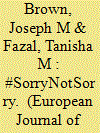

|
|
|
|
|
| Summary/Abstract |
States accused of perpetrating cyber operations typically do not confirm or deny responsibility. They issue ‘non-denial denials’ or refuse to comment on the accusations. These ambiguous signals are prevalent, but they are largely ignored in the existing cyber literature, which tends to treat credit claiming as a binary choice. The ambiguity of non-denial denials and ‘non-comments’ allows states to accomplish two seemingly opposed goals: maintaining crisis stability and leaving open the possibility of their involvement in the attack. By deliberately remaining a suspect, a state can manipulate rivals’ perceptions of its cyber capability and resolve. Refusing to deny responsibility can also shape rivals’ perceptions of allies’ capabilities, enhancing the credibility of deterrence. All of this can be accomplished without the escalatory risks that would come with an explicit admission of responsibility. Where previous research has focused on the dangers of escalation and the limitations of costly signalling with cyber, we show that non-denial denials and non-comments make cyber operations considerably more useful than the literature appreciates.
|
|
|
|
|
|
|
|
|
|
|
|
|
|
|
|
| 2 |
ID:
134089
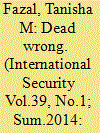

|
|
|
|
|
| Publication |
2014.
|
| Summary/Abstract |
Is war in decline? Recent scholarship suggests that it is. The empirical basis for this argument is a decline in battle deaths over the past several centuries, a standard metric for counting wars and armed conflicts. Dramatic improvements in medical care in conflict zones-in preventive medicine, battlefield medicine, evacuation, and protective equipment-have raised the likelihood of surviving battle wounds today compared with past eras. Thus the fact that war has become less fatal does not necessarily mean that it has become less frequent. Original data on wounded-to-killed ratios, supplemented by medical research and interviews with physicians from the military and nongovernmental communities, is used to advance this claim. The results show that the decline in war is likely not as dramatic as some scholars have argued. These findings question the foundation of existing datasets on war and armed conflict. They also highlight the growing need for policy focused on the battle wounded.
|
|
|
|
|
|
|
|
|
|
|
|
|
|
|
|
| 3 |
ID:
124384
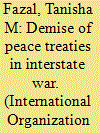

|
|
|
|
|
| Publication |
2013.
|
| Summary/Abstract |
The conclusion of peace treaties following war was a norm of international politics for millennia. Since approximately 1950, however, the rate at which interstate wars have ended with a formal peace treaty has declined dramatically. I argue that the costs of concluding peace treaties have risen with the development of the modern canon of the law of war. Using an original data set, I find that states today prefer to avoid admitting to a state of war and risk placing their leaders and soldiers at risk of punishment for any violations of the law of war.
|
|
|
|
|
|
|
|
|
|
|
|
|
|
|
|
| 4 |
ID:
162397
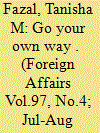

|
|
|
| 5 |
ID:
165316


|
|
|
|
|
| Summary/Abstract |
Why do some armed groups commit to abide by the laws of war governing belligerent conduct during armed conflict, while others do not? We examine why only half the armed groups approached by the nongovernmental organization Geneva Call have signed a public Deed of Commitment banning the use of antipersonnel land mines. In contrast to recent studies that have tended to focus on the legitimacy concerns of armed groups, we argue that political objectives combine with military utility calculations to shape the behavior of armed groups in the realm of international humanitarian law. Utilizing original data on the ninety armed groups engaged by Geneva Call since 2000, we find that strong secessionist groups are most likely to sign the Deed of Commitment. Our findings have important implications for theories of international law, the study of civil wars, and on the ground efforts to mitigate the human costs of war.
|
|
|
|
|
|
|
|
|
|
|
|
|
|
|
|
| 6 |
ID:
130930


|
|
|
|
|
| Publication |
2014.
|
| Summary/Abstract |
We argue that system-level international changes have made secessionism more attractive since 1945, and that this is one of the reasons for the recent Proliferation of Aspiring States. Using original data on secessionist movements between 1816 and 2011, we document that secessionism became significantly more common after 1945. Whereas much of the existing literature explains secessionism by pointing to local or unit-level factors, we contend that security, economic, and normative changes at the international level have effectively increased the benefits of independence, without a commensurate increase in the costs. We use interviews with representatives of new states, secessionist groups, and international organizations to provide empirical support for these claims. We conclude by considering three extensions of our argument: (i) Does the nature of the changing international environment affect the way in which secessionists attempt to achieve their goals? (ii) What future changes might amplify or depress this trend? (iii) Who are the specific people benefiting from statehood, and can their position within a would-be state help us understand the nature of secessionism today?
|
|
|
|
|
|
|
|
|
|
|
|
|
|
|
|
| 7 |
ID:
147901
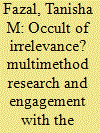

|
|
|
|
|
| Summary/Abstract |
Many security studies scholars concerned with the policy relevance of the field have argued that the use of quantitative methods impairs policy relevance. I investigate this claim by looking at the relationship between research methods on the one hand and the supply of and demand for policy-relevant research on the other. I argue that scholars using quantitative methods, either on their own or in tandem with qualitative methods, appear to be increasingly likely to conduct and disseminate policy-relevant research. I also find that curricular changes in policy schools as well as new information technologies mean that policymakers are increasingly able to consume research based on quantitative methods. These trends suggest that the current focus on methodology as the explanation for policy irrelevance may be misplaced.
|
|
|
|
|
|
|
|
|
|
|
|
|
|
|
|
| 8 |
ID:
151761
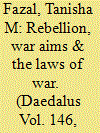

|
|
|
|
|
| Summary/Abstract |
Most wars today are civil wars, but we have little understanding of the conditions under which rebel groups might comply with the laws of war. i ask three questions in this essay: What do the laws of war require of rebels, or armed nonstate actors (ansas)? To what extent are rebels aware of the laws of war? Under what conditions do rebel groups comply with international humanitarian law? i argue that the war aims of rebel groups are key to understanding their relationship with the laws of war. In particular, secessionist rebel groups – those that seek a new, independent state – are especially likely to comply with the laws of war as a means to signal their capacity and willingness to be good citizens of the international community to which they seek admission.
|
|
|
|
|
|
|
|
|
|
|
|
|
|
|
|
| 9 |
ID:
158449
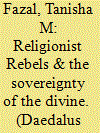

|
|
|
|
|
| Summary/Abstract |
Existing categorizations of rebel groups have difficulty classifying some of today's most vexing rebels–those, such as the Islamic State, that reject the Westphalian state system and depend on an almost entirely religious justification for their cause. Such rebel groups often have unlimited war aims and are unwilling to negotiate with the states whose sovereignty they challenge. In this essay, I present the new category of “religionist rebels.” I show that religionist rebels have been present throughout the history of the state system, and explore the particular challenges they pose in the civil war context. Religionist rebels are often brutal in their methods and prosecute wars that are especially difficult to end. But the nature of religionist rebellion also suggests natural limits. Thus, religionist rebels do not, ultimately, present a long-term threat to the state system.
|
|
|
|
|
|
|
|
|
|
|
|
|
|
|
|
| 10 |
ID:
186879
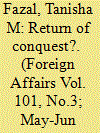

|
|
|
| 11 |
ID:
053442
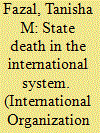

|
|
|
| 12 |
ID:
116239
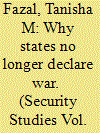

|
|
|
|
|
| Publication |
2012.
|
| Summary/Abstract |
Why have states stopped issuing declarations of war? Declaring war was a norm of international politics for millennia, but now appears to have exited states' behavioral repertoires. I argue that the proliferation of codified jus in bello, the law of war governing belligerent conduct, has created disincentives for states to issue formal declarations of war. The increasing number of codified international laws that govern belligerent conduct during warfare has made complying with the laws of war extremely costly. One way for states to limit these costs is to avoid admitting they are in a formal state of war by refraining from declaring war. I test this claim, as well as others, using an original data set. I also discuss several cases of nineteenth and twentieth century wars that illustrate the logic of this argument.
|
|
|
|
|
|
|
|
|
|
|
|
|
|
|
|
|
|
|
|
|